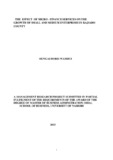| dc.description.abstract | The Small and Medium Enterprise (SME) sector has continued to play an important role in
Kenyan Economy. Promotion of Small and Medium Enterprises (SME) sector in Kenya is a
viable and dynamic strategy for attaining the national goals which includes employment
creation, balanced development between sectors and poverty alleviation. All these form the
foundation of strong national industrial base and domestic production structure that are very
central to our government‘s vision to achieving newly industrialized country status by the
year 2020 (sessional paper No.2(1996). Small and Medium Enterprises (SMEs) is an
important sub sector for the Kenyan economy like many other developing countries since it
employs about 85% of the Kenyan workforce. Various studies have been done in Kenya on
SMEs and how they are influenced by microfinance services but none had focused on the
effects of microfinance services on the growth of the SMEs. The main objective of this study
was to find out the effects of microfinance services on the growth of Small and Medium
Enterprises in Kajiado County.
A quantitative descriptive design was used to study 9 types of business categories in Kajiado
County. The study was on dependence and independence relationship. A multiple regression
analysis was used. A partial correlation analysis was applied to determine the relative
importance of each of the four variables; microcredit, micro insurance, training and micro
saving, with respect to the effects of microfinance services on the growth of SMEs. The
ANOVA analysis was used and intended to investigate whether the variation in the
independent variables explains the observed variance in the outcome – in this study the
annual growth in turnover.
The findings of the regression analysis conducted established that the independent variables
had a positive correlation with the dependent variable. ANOVA findings in this study showed
that there was correlation between the predictor variables (Microcredit, Micro insurance,
Training provided by MFIs and Micro savings) and response variable (Annual growth in
turnover) since P- value of 0.001 is less than 0.05. This indicated that there was a strong
positive relationship between the study variables. | en_US |

